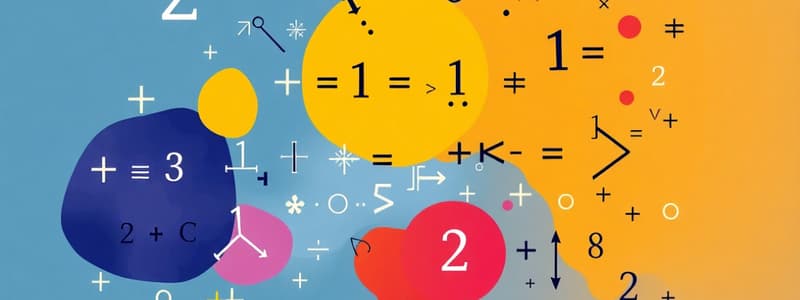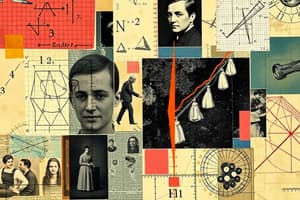Podcast
Questions and Answers
What is the primary focus of discrete mathematics?
What is the primary focus of discrete mathematics?
- Countable mathematical structures and their applications (correct)
- Solving equations involving derivatives
- Properties of integers and their relationships
- Analyzing vector spaces and matrices
Which of the following concepts is not typically associated with number theory?
Which of the following concepts is not typically associated with number theory?
- Divisibility rules
- Prime numbers
- Linear transformations (correct)
- Greatest common divisors (GCD)
In the context of statistics, what is the purpose of probability?
In the context of statistics, what is the purpose of probability?
- To draw inferences about populations from samples (correct)
- To create frequency distributions and histograms
- To visualize data through graphs and charts
- To calculate the mean and median of a data set
What type of equations do differential equations involve?
What type of equations do differential equations involve?
Which operation is not typically used in linear algebra?
Which operation is not typically used in linear algebra?
Which operation is not a fundamental arithmetic operation?
Which operation is not a fundamental arithmetic operation?
Which branch of mathematics primarily studies shapes and their properties?
Which branch of mathematics primarily studies shapes and their properties?
What is a common technique used in calculus to find the derivative of a function?
What is a common technique used in calculus to find the derivative of a function?
Which of the following represents an irrational number?
Which of the following represents an irrational number?
What is an essential property of operations in arithmetic?
What is an essential property of operations in arithmetic?
Which of the following is a key concept in algebra?
Which of the following is a key concept in algebra?
What is the relationship between derivatives and rates of change in calculus?
What is the relationship between derivatives and rates of change in calculus?
Which aspect is primarily involved in statistics?
Which aspect is primarily involved in statistics?
Flashcards
Frequency Distribution
Frequency Distribution
A statistical method that uses graphs and charts like histograms to show the frequency of different data values.
Standard Deviation
Standard Deviation
A measure of how spread out a dataset is. It's calculated by finding the average squared distance of each data point from the mean.
Prime Number
Prime Number
A number that can only be divided evenly by 1 and itself. Examples are 2, 3, 5, 7, 11, 13...
Discrete Mathematics
Discrete Mathematics
Signup and view all the flashcards
Differential Equation
Differential Equation
Signup and view all the flashcards
What is mathematics?
What is mathematics?
Signup and view all the flashcards
Name some key branches of mathematics.
Name some key branches of mathematics.
Signup and view all the flashcards
How does mathematics build upon established truths?
How does mathematics build upon established truths?
Signup and view all the flashcards
What is the importance of proofs in mathematics?
What is the importance of proofs in mathematics?
Signup and view all the flashcards
What is arithmetic?
What is arithmetic?
Signup and view all the flashcards
What is algebra?
What is algebra?
Signup and view all the flashcards
What is geometry?
What is geometry?
Signup and view all the flashcards
What is calculus?
What is calculus?
Signup and view all the flashcards
Study Notes
Fundamental Concepts
- Mathematics is a formal system that uses logic and abstraction to model and analyze various aspects of the world.
- Key branches of mathematics include arithmetic, algebra, geometry, calculus, and statistics.
- Mathematics relies on axioms, postulates, or definitions to build upon established truths and deduce new theorems.
- Mathematical proofs are essential for establishing the validity of results.
Arithmetic
- Arithmetic is the foundation of mathematics, focusing on the basic operations of numbers (addition, subtraction, multiplication, and division).
- It involves understanding number systems (natural, whole, integers, rational, irrational, real, and complex).
- Properties of operations (commutative, associative, distributive) are crucial in arithmetic calculations.
- Order of operations (PEMDAS/BODMAS) is essential for evaluating expressions containing multiple operations.
Algebra
- Algebra expands on arithmetic by introducing variables (symbols representing unknown quantities) and equations to solve problems.
- It involves manipulating equations and expressions to isolate variables and find their values.
- Basic algebraic operations include simplifying expressions, solving linear equations, factoring, and solving quadratic equations.
- Concepts like polynomials, exponents, and radicals are fundamental in algebraic manipulations.
Geometry
- Geometry studies shapes, sizes, and positions of figures in space.
- It involves understanding various geometric figures (points, lines, angles, triangles, quadrilaterals, circles, etc) and their properties.
- Geometric theorems provide relationships between different geometric figures.
- Concepts like congruence, similarity, and transformations are crucial for understanding geometric properties.
Calculus
- Calculus deals with continuous change and motion in mathematical entities.
- Key concepts include limits, derivatives (rates of change), and integrals (accumulated change).
- Calculus is used extensively in science and engineering to model and solve problems involving motion, optimization, and area calculations.
- Techniques for calculating derivatives (e.g. power rule, product rule, quotient rule) and integrals (e.g. substitution methods, integration by parts) are essential.
Statistics
- Statistics is a branch of mathematics dealing with the collection, analysis, interpretation, and presentation of data.
- It involves organizing, summarizing, and visualizing data using various techniques (e.g., frequency distributions, histograms, mean, median, mode, standard deviation).
- Statistical methods help in drawing inferences about populations from samples.
- Probability plays a crucial role in understanding and applying statistical concepts.
Number Theory
- Number theory deals with the properties of integers.
- Prime numbers, divisibility rules, and greatest common divisors (GCD) are important concepts.
- Diophantine equations also form a core part of this area.
Discrete Mathematics
- Discrete mathematics focuses on countable mathematical structures.
- Topics include logic, sets, counting, graph theory, and combinatorics.
Linear Algebra
- Linear algebra investigates vector spaces, linear transformations, and matrices.
- This includes concepts like systems of linear equations, eigenvalues and eigenvectors, and matrix operations.
Differential Equations
- Differential equations deal with equations involving derivatives.
- Methods for solving them, both analytically and numerically, are often necessary for physical and biological models.
Studying That Suits You
Use AI to generate personalized quizzes and flashcards to suit your learning preferences.




